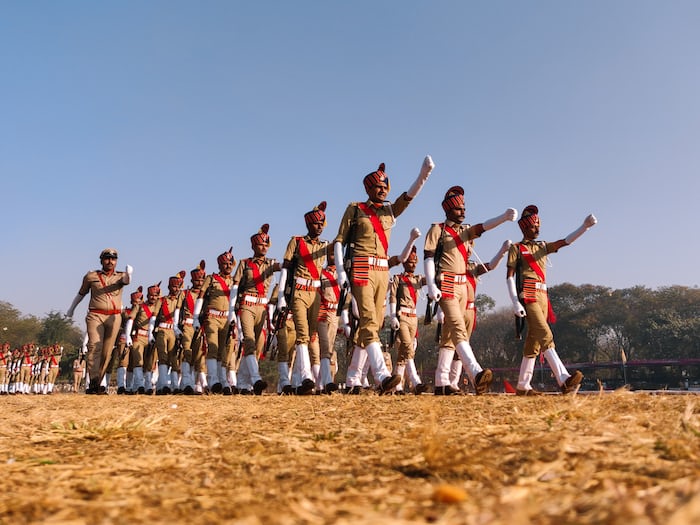Neighbouring countries of India
India with its rich cultural and traditional heritage and diverse socio-political geography, shares its borders with several neighboring countries. These countries play a crucial role in shaping India's political, economic, social, psychological and cultural dynamics, stability and development. India covers an area of 32,87,263 sq. km. extending from Himalayan heights in the north to tropical rain forests of the south. India is the 7th largest country in terms of area and first country in terms of population in the world. Having Arabian Sea on the south-west, Bay of Bengal in the south-east and Indian Ocean in the south, India is taking care of approximately 143 crore people. Life expectancy in India is 72.5 years.

Countries sharing land borders with India:
In total seven i.e. Bangladesh to the east, Myanmar to the Far East, China, Bhutan, Nepal to the north & Pakistan, and Afghanistan to the north-west are the seven countries sharing land borders with India. Afganistan shares the shortest land border of 106 km while Bangladesh shares longest land border with India of about 4096.7 km.
Following are the Neighbouring countries of India:
1. Pakistan
2. China
3. Afghanistan
4. Nepal
5. Bhutan
6. Bangladesh
7. Myanmar
8. Sri Lanka
9. Maldives
Pakistan:
India's relationship with Pakistan has been characterized by a complex history, marked by
conflicts and occasional attempts at reconciliation. The boundary line between India and
Pakistan is called Radcliffe line, spread through the Rann of Kutch in Gujarat to the
international border in Jammu in Jammu & Kashmir.
Radcliffe divided India into three halves:
• West Pakistan
• East Pakistan ( now Bangladesh)
• India
The two countries share a border and have faced various territorial disputes and conflicts,
most notably over the region of Kashmir. The cross border terrorism is the biggest cause of
concern regarding the complex association between the two countries. Terrorism emanating
from territories under Pakistan’s control remains a core concern in bilateral relations.
India has consistently stressed the need for Pakistan to take credible, irreversible and
verifiable action to end cross border terrorism against India and fulfil its assurances.
China:
India shares a vast and diverse border with China, extending across the Himalayas. The relationship between the two nations has been a mix of cooperation, competition, and occasional tensions. While trade and economic ties have grown significantly in recent years, border disputes, such as the Doklam standoff in 2017 and clashes in the Galwan Valley in 2020, have strained relations. Both countries, however, recognize the importance of maintaining stable ties for regional stability and economic growth.
Specific areas of cooperation between India and China:
- Trade and investment: India and China are each other's largest trading partners. In 2022, bilateral trade between the two countries reached $125 billion.
- Infrastructure: China has invested heavily in infrastructure projects in India, such as roads, railways, and power plants.
- Climate change: India and China are both major emitters of greenhouse gases. The two countries have worked together on a number of climate change initiatives, such as the Paris Agreement.
- Nuclear non-proliferation: India and China are both members of the Nuclear Non-Proliferation Treaty (NPT). The two countries have worked together to promote nuclear non-proliferation and disarmament.
Challenges in the India-China relationship:
These include:
• The disputed border between the two countries: India and China have a long-standing
dispute over their border in the Himalayas. This dispute has led to several armed clashes
between the two countries.
• China's growing military presence in the Indian Ocean: China has been increasing its
military presence in the Indian Ocean in recent years. This has raised concerns in India
that China is seeking to encircle India and challenge its dominance in the region.
• The rise of nationalism in both countries: There is a growing sense of nationalism in both
India and China. This nationalism has made it more difficult for the two countries to
cooperate on issues of mutual interest.
Nepal:
Nepal being a landlocked country nestled in the lap of the Himalayas shares a deep historical, cultural, and economic bond with India. The two nations have an open border, facilitating people-to-people contact and trade. India has supported Nepal in its development efforts, including infrastructure projects and humanitarian aid. However, occasional political differences and concerns over India's influence have strained the relationship, necessitating sustained diplomatic efforts.
Bhutan:
Bhutan is one of the closest and most enduring friend of India. Both share deep cultural, economic, and political ties. India has played a crucial role in Bhutan's development. India has been involved in infrastructure projects, education, and healthcare in Bhutan. The two countries maintain close coordination on various regional and international issues and have a strong sense of mutual trust and cooperation.
Bangladesh:
India's relationship with Bangladesh( earlier east Pakistan) has witnessed significant improvement in recent years. Historical differences and the aftermath of the 1971 Bangladesh Liberation War have given way to closer ties and cooperation between both. The two countries have collaborated on issues such as trade, connectivity, security, and the management of shared rivers. India has extended assistance to Bangladesh in various development projects including infrastructure and energy.
Myanmar:
India shares a border with Myanmar in its northeastern region. The relationship between the two countries has evolved positively with a focus on connectivity, trade, and security cooperation. India's "Act East" policy seeks to enhance ties with Southeast Asian nations wherein Myanmar plays a crucial role in this context. Economic integration, cultural exchanges, and counterterrorism efforts are key areas of cooperation.
Sri Lanka:
Sri Lanka is an island nation in close proximity to India. It shares a deep cultural and historical bond with its neighbor. Bilateral relations have been multifaceted, encompassing trade, defense cooperation, and people-to-people exchanges. Both countries face challenges related to fisheries, maritime security, and ethnic tensions. India has supported Sri Lanka in its post-war reconstruction efforts and continues to foster mutual understanding and collaboration.
Maldives:
The Maldives is an archipelago in the Indian Ocean, enjoys a friendly relationship with India. Both countries share strategic maritime interests and cooperate on various fronts including defense, trade, and tourism. India has extended assistance to the Maldives in infrastructure development and capacity building. The two nations work together on many issues such as climate change, maritime security, and regional cooperation.
Afghanistan:
The contact between the people of modern-day India and Afghanistan has existed since the days of the Indus Valley Civilization. A number of invaders invaded the northern regions of India between the 10th century to the mid 18th century by a number of invaders such as Ghaznavids, Ghurids, Khaljis, Suris, Mughals, and Durranis on what today is known as Afghanistan. India was the only South Asian country to recognize the Soviet-backed Democratic Republic of Afghanistan in the 1980s, though relations were diminished during the 1990s Afghan civil war and the Taliban government. India aided the overthrow of the Taliban and became the largest regional provider of humanitarian and reconstruction aid to Afghanistan. Indians are working in various construction projects, as part of India’s rebuilding efforts in Afghanistan. Afghanistan shares border with POK which is a part of India and that is why it is included in our neighbor countries.
To sum up…
India's neighboring countries hold immense significance for its political, economic, and cultural landscape. While challenges persist in some relationships, efforts are continuously made to strengthen ties and foster cooperation. Maintaining peaceful and constructive relationships with neighboring nations is crucial for regional stability, economic growth, and addressing common challenges. Through sustained diplomacy and a focus on shared interests, India strives to create an environment of peace, collaboration, and mutual prosperity in its neighborhood.


